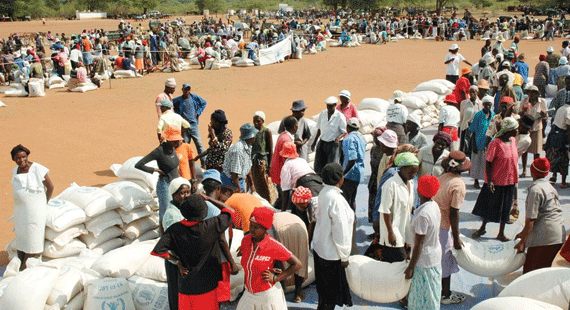
'I packed my bag and left,” the opening line in Dambudzo Marechera’s most popular and award winning book — House of Hunger. Many Zimbabweans are contemplating the same post the controversial August 2023 general elections.
Zimbabwe is literally becoming a house of hunger. Many families cannot feed themselves; violence is on the rise, alcoholism and drug abuse are becoming prevalent just as Marechera wrote. Many are left with no option, but to ‘pack their bags and leave’ mainly to rural areas or diaspora.
The country will soon face an acute shortage of food despite the production figures touted from Pfumvudza and command agriculture over the last two seasons. The government was shouting from the rooftop that Zimbabwe was food secure for the immediate future. However, with the threat of El Nino on the horizon, reality has sunk that propaganda is not good.
Finance minister Mthuli Ncube let the hunger cat out of the bag when he gave a speech on the incentive planning prices for the 2023/24 season this week in Harare.
The minister said they were giving incentives to farmers so that the country could be secure, but the sting was in the tail when he said the government had removed the duty for the importation of maize.
“We are opening up borders with immediate effect and allowing the private sector to import maize with no duty as well. The same thing applies to the household imports of maize meal which we opened a few months ago. That continues to ensure supply so private players should engage in importation of grain. We want to support our citizens,’’ Ncube told the State-controlled media.
Agriculture minister Anxious Masuka emphasised that permitting imports of maize by private players was with immediate effect and that companies with resources could import as much as they wished.
There is no tacit confirmation stronger than that proving the silos are running empty. The stark reality staring in the face is hunger — no two ways about it.
- Chamisa party defiant after ban
- Village Rhapsody: How Zimbabwe can improve governance
- News in depth: Partisan police force persecutes opposition, shields Zanu PF rogue elements
- Chamisa chilling death threat bishop defiant
Keep Reading
Zimbabwean inflation is mainly food inflation, the rising cost of food. Zimbabweans have to brace themselves for higher food prices and for good measure in greenbacks. Imported food using private funds will be sold in United States dollars. The re-dollarisation of the economy will be on steroids. No one can avoid food.
If the economy completely dollarises and imports rise, it is no rocket science that the local currency will further lose value against the greenback, plunging the majority of the population into abject poverty. Many will vote by their feet going into the diaspora to seek economic refuge.
However, in all this gloom, there is a sliver of light in urban areas. There are a lot of good men and women who chose not to pack their bags and leave. They decided not only to stick it out, but also chose to rebuild their country by participating in national politics at the local authority level.
The opposition Citizens Coalition for Change made a clean sweep of the urban councils. Its cadres have assumed office. They are occupying the top offices and are ready to deliver.
It is important to acknowledge that by putting Ian Muteto Makone and David Coltart as mayors of Harare and Bulawayo respectively, the opposition has shown its intention to change the fortunes of the two main cities.
Makone is a consummate boardroom player. He has in the past held senior positions such as chairperson of listed entities First Mutual Life and Colcom. He was also the first black general manager of the Grain Marketing Board and also served as managing director of Manica Freight Southern Africa. Makone has seen it all and knows what it takes to turn the fortunes of Harare.
On the other hand, Coltart is a senior lawyer at one of Bulawayo’s oldest law firms. He served as chairperson of the SDC at Petra and had a fairly good stint as Primary and Secondary Education minister during the 2009-2013 inclusive government. Coltart knows what is needed to turn Bulawayo around and has the competence.
These are men who could have packed their bags and left the country, yet they stuck around. It is expected that they will lead their caucuses in council well and craft good turnaround policies. The council administrations in Harare and Bulawayo should simply do their jobs and avoid dabbling in partisan politics.
It is also worthy to note that the new Local Government minister Winston Chitando is also a seasoned boardroom player. We hope that he would be above partisan political fray and steer the devolution agenda, facilitating that councils work as autonomously as possible within the law. Zimbabwe still needs to enact a devolution-enabling legislation and this has to be done like yesterday.
The success of Harare and Bulawayo is good for the revival of Zimbabwe’s economy. It could give a good kickstart to economic revival if well managed. There are lots of infrastructure projects that need to be implemented such as building of dams, road networks, new sewer treatment plants, schools and clinics to cater for the burgeoning populations.
However, the temptation to privatise public services should be kept at bay. At worst, they could form joint ventures where the local authorities maintain the majority shareholding, after all cities are not for profit entities. They should offer services to their residents at cost or near cost recovery costs.
The tasks ahead are not easy, but not insurmountable. At some point painful and unpopular decisions have to be made if the cities are to regain their lustre. However, consensus building and vision sharing should always be at the forefront. Residents trust and buy-in has to be earned if success is to be achieved. Otherwise, many residents as in the opening line of House of Hunger will ‘pack their bags and leave’.







